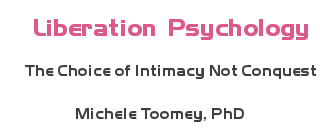How to Teach Confrontation with Accountability and Prevent Hostility and Abuse
© 2000 Michele Toomey, PhD
The primary way to teach confrontation with accountability is to live it. Instead of swallowing your feelings and building resentment, learn how to express those feelings, thus being accountable yourself. Then ask the relevant person why they said or did what they did, asking them to be accountable. Instead of reacting defensively when someone confronts you, stop yourself, ask yourself to go inside and discuss why you said or did what you did, thus being accountable to yourself and to another. Instead of reacting angrily and attacking another, blaming them for whatever occurred and verbally assaulting them for it, stop and listen to your angry feelings and ask yourself why you are so angry, then express your anger with honesty and fairness, being accountable and also confrontive.
In each of these instances, we are in a position to demonstrate both the integrity and fairness of confrontation with accountability. We can also demonstrate its effectiveness and its power. Instead of hostility and estrangement or abuse, there will be growing understanding and a chance to care and be intimate and known. A far more desirable state and a far less stressful or hostile one.
As parents or teachers, we should start from this place of living out of integrity and fairness expressed by confrontation and accountability. It is our most powerful way of teaching our children. In addition, we must talk with them, beginning as young as five years old, about fairness and accountability. We must also teach them the difference between a confrontation and an attack, emphasizing the fact that claiming what's going on and being accountable for it is the purpose of a confrontation. It is an equalizing encounter designed to discover what's underneath what's being said and done, not an attempt to defeat the other by humiliating them or breaking them down. Children resonate with fairness. They feel secure and safe when protected by fairness, and they are relieved to be connected with each other in a comfortable way.
They must also be helped to pull off difficult confrontations. It should be standard operating procedure, both at home and at school, that whenever they have tried to resolve something that is upsetting them with a fair confrontation and it doesn't work, they are to come to the appropriate adult for help. Either parent or teacher should gladly listen to the stressed child and proceed to get all the relevant parties together at one time to confront each other with your help. Facilitating confrontations is a powerful vehicle for teaching confrontation with accountability. Reported needs should never be allowed to go unattended. That is a cardinal rule for fairness and assuring that it will become the norm. The whole "don't be a tattle-tale" routine must be eliminated and replaced by "do seek help when you need it."
Never talk just to one child at a time and then relay the consequences and outcomes to the others. This builds up a sense of sides and arguing one's case and defending one's actions. They must always be brought together and each given a chance to speak, to claim and to confront in front of each other.
Out of a well facilitated confrontation and accountability session will evolve a resolution of its own. As they hear each other and learn what was going on for each other, the tone will change and understanding will lead to caring, and soon a fair climate will emerge. Apologies and handshakes or hugs may occur, restitution if appropriate may be agreed upon, and there will be movement. They will be relieved and begin to hold great stock in the process. Eventually, they learn to rely on the powerful effect of confrontation with accountability and it becomes the norm. Home and school become a safe place where truth and fairness meet. The climate is one that breeds the potential for good relationships, fair exchanges, and even a greater desire to learn.
Not so pre-occupied with upsetting encounters and alienated feelings, children are more able to focus their attention on learning and are more comfortable with themselves and their classmates as they learn. Not only does estrangement, abuse and violence become less, on some level it becomes a non issue. The orientation has changed to one of discovering, not defeat, and everything looks different. True education is occurring.
For the few who resist being accountable, it may take longer and certainly more effort, but over time it will be the very, very few who refuse ever to join the ranks of the fair. Peer pressure and the success of the confrontations with accountability become a powerful force. However, some groups, some schools, some age groups, may contain those very, very few. When time, effort, every possible means have failed to get them on board, then steps need to be taken to remove them from the scene. Some intervention is needed. Therapists, counselors, and/or social workers need to become involved and an appropriate intervention needs to occur. Those children should not re-enter the home or school until they have successfully begun to open up to fairness and are willing to play by those rules. Only then can they be given a second chance. If they still refuse, then interventions are their lot. They cannot be allowed to disrupt or terrorize their family or their school. It is not good for them to have that kind of abusive power and of course it is not good to allow others to be abused.
However, barring the very, very few children who can't or won't learn fairness, teaching confrontation with accountability is an exciting and wonderful experience. I promise you it will become one of the finest things you'll ever do and one of the most life changing. |



